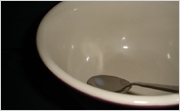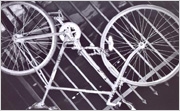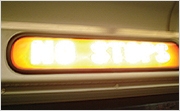|
|
||||||||
 |
 |
 |
 |
|
||||
|
|
|
|
|
|
|
|
|
|


‘Hope’
by
She thought they would take longer to get
there. The voice on the old radio seemed always to be
speaking of a distant land, some far-off kingdom. Every
night, as her father pulled the sheets up and over her body
that shook in the cold, he assured her that in the morning,
there would be school. Children would run as they always
had, carefree and optimistic. Businessmen would put on
three-piece suits and board trains to the center of town.
Mothers would rise early, making breakfasts and reading
the gossip pages. Bakers would fill the neighborhoods
with the aroma of perfectly blended spices amid flour and
yeast. Streetlights would dim and go out. Car horns
would blow. Sunlight would scream down alleyways,
bouncing off windowpanes and setting the day aflame.
She could accept that he had lied, but she
could never forgive him. Peering over the hill, she saw
them marching, driving, crawling like rats, hungry for their
next meal. It did little good to run. She was not
too young to know this. She was not too young to
understand.
Classes would be canceled and school would
close. The children would run into the arms of their
parents or whoever was left. The men would leave their
suits hanging perfectly in closets while women stuffed boxed
and canned food into bags too heavy to carry far.
Shopkeepers would take leave of their baked goods and
flowers and morning newspapers. The roads would choke on
idling automobiles beneath the broken streetlights. The
sun would look on as the sky obscured itself, hiding behind the
smoke, waiting its turn.
She stood, brushing dust from her knees and
slinging her knapsack over her left shoulder. She would
walk down the hill, back into town, past her home, past the
schoolhouse, down the darkened streets and back to hope:
the only lie left worth believing.

